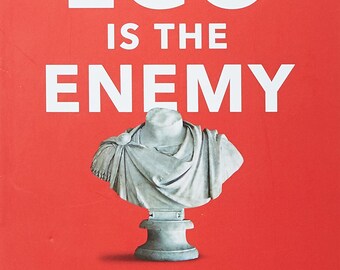
In other words, the less attached we are to outcomes the better. It’s far better (and more resilient) when doing good work is sufficient.

Wanted to say: “Fuck ‘em, they don’t appreciate me anyway.” Yet in ego, every one of us has considered doing precisely that. Should they have not done it? Should they not be kind, not work hard, not produce, because there is a chance it wouldn’t be reciprocated? C’mon. The inventors whose ideas languish “ahead of their time.” According to society’s main metrics, these people were not rewarded for their work. The leaders who are assassinated before their work is done. Think of all the activists who will find that they can only advance their cause so far. It takes humility to admit that we have only minimal control over the rewards for our work and effort-other people’s validation, recognition, rewards. If my happiness is dependent on those things going my way, then I have made a momentous and dangerous gamble. There is so much outside of my-outside of all of our-control. Some critic with a bone to pick could attack me and others might follow their lead. An unexpected news story could interrupt the scheduled media and drown out everything I had planned. We are all faced with this same challenge in the pursuit of our own goals: Will we work hard for something that can be taken away from us? Will we invest time and energy even if an outcome is not guaranteed? With the right motives we’re willing to proceed. What was his alternative? Should he have done the wrong thing instead? Indignation is the reaction we’d have if it happened to us or someone we know. Which is good, because not only was he often not rewarded for the good he did, he was punished for it. Any adversity could be endured and any rewards were considered extra.

Serving his country, his God, and doing his duty faithfully was all that mattered. What was so special about Belisarius was that he accepted the bargain. This reality rings essentially true for everyone in every kind of life. He had no ability to control whether a powerful dictator would treat him well. He could not control whether his work was appreciated or whether it aroused suspicion. It is judged, received, and acted on by other people.It stops being something he controls and it depends on them.īelisarius could win his battles.
#MARCUS AURELIUS QUOTE EGO IS THE ENEMY FULL#
If ego holds sway, we’ll accept nothing less than full appreciation.Ī dangerous attitude because when someone works on a project-whether it’s a book or a business or otherwise-at a certain point, that thing leaves their hands and enters the realm of the world. Yet the results will somehow be negative: failure, disrespect, jealousy, or even a resounding yawn from the world.ĭepending on what motivates us, this response can be crushing. In life, there will be times when we do everything right, perhaps even perfectly. While the Emperor Justinian fell prey to all the vices of absolute power-control, paranoia, selfishness, greed-we see none in Belisarius. Ironically, as the head of the army he likely could have taken the throne on numerous occasions, though it appears he was never even tempted. The one person we don’t hear complaining about any of this? Not at the time, not at the end of his life, not even in private letters: Belisarius himself. Like all fair minded people, they’re outraged at the stupidity, the ungratefulness, and injustice that this great and unusual man was subjected to. Historians, scholars, and artists have lamented and argued about this treatment for centuries.

His only remaining title was the deliberately humiliating “Commander of the Royal Stable.” Oh, and at the end of his illustrious career, Belisarius was stripped of his wealth, and according to the legend, blinded, and forced to beg in the streets to survive. His victories and sacrifices were undone with bad politics. Instead, he was repeatedly placed under suspicion by the paranoid emperor he served. His thanks? He was not given public triumphs. He reclaimed far flung territories and recaptured Rome for the first time since it fell-all before he was 40. He saved a cowardly Justinian from a riotous mob. He won brilliant victories at Dara, Carthage, Naples, Sicily, and Constantinople. As Rome collapsed and the seat of the empire moved to Constantinople, Belisarius was the only bright light in a dark time for Christianity.

As Rome’s highest ranking commander under the Byzantine emperor Justinian, Belisarius saved Western civilization on at least three occasions. At least they named the Marshall Plan after George. His name has been so obscured and forgotten by history that he makes the under appreciated General George Marshall seem positively famous. Goetheīelisarius is one of the greatest yet unknown military generals in all of history. What matters to an active man is to do the right thing whether the right thing comes to pass should not bother him.


 0 kommentar(er)
0 kommentar(er)
